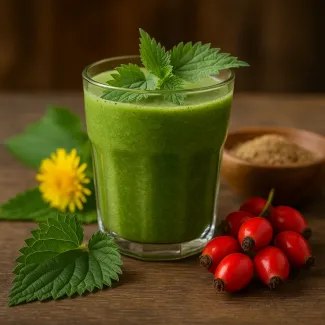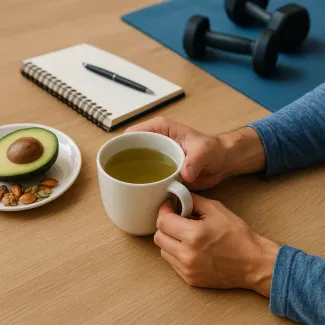
Herbal synergy for daily energy and blood support
Discover how nettle, rosehip, and dandelion enhance vitality naturally
The combined use of nettle, rosehip, and dandelion offers a powerful way to support the body's circulatory system, natural detoxification, and energy levels. These three plants are known for their individual health benefits, but when used together—whether in a tonic, infusion, or smoothie—they create a potent blend that can be easily integrated into a daily wellness routine. Unlike synthetic supplements, these herbs provide a natural source of nutrients that many adults over 30 begin to require more consciously.
Daily exposure to stress, processed foods, and environmental pollutants often leads to fatigue, weakened immunity, and poor blood quality. Supporting the body with plant-based tonics can be one of the simplest yet most effective choices for promoting overall well-being. The synergy of minerals, vitamins, and bioactive compounds in these herbs makes them especially suitable for those looking to boost energy naturally, improve blood circulation, and restore inner balance.
Nettle: the green powerhouse of blood-building minerals
Why nettle is a core ingredient in herbal energy blends
Nettle (Urtica dioica) is widely recognized for its rich mineral profile, particularly its content of iron, magnesium, calcium, and silica. These nutrients are vital for red blood cell formation, oxygen transport, and maintaining strong bones and connective tissue. People often turn to nettle when dealing with low energy, iron deficiency, or seasonal allergies—but its most significant long-term benefit may be its effect on blood health and metabolic resilience.
What makes nettle ideal for smoothies or tonics is its mild, grassy flavor and easy assimilation. When consumed regularly, it acts as a gentle blood purifier, stimulating the lymphatic system and encouraging the body to release stored toxins. It's particularly supportive for individuals experiencing chronic fatigue, low-grade inflammation, or difficulty recovering from illness.
Nettle also supports adrenal health, which plays a major role in sustaining energy levels throughout the day. In times of mental and physical stress, adding nettle to your diet can help buffer the impact of stress hormones and maintain steady energy without stimulants like caffeine.
Rosehip: antioxidant-rich fruit for immune and skin vitality
The importance of rosehip in circulation and collagen production
Rosehip (Rosa canina), the fruit of the wild rose, is a true vitamin C powerhouse. It contains significantly more ascorbic acid than oranges, making it one of the best natural sources of this essential antioxidant. Vitamin C is vital not just for immune function, but also for collagen synthesis, capillary strength, and iron absorption—a crucial point when combining rosehip with nettle, which is high in plant-based iron.
One of rosehip’s unique properties is its ability to fight oxidative stress, thanks to its high content of polyphenols, carotenoids, and flavonoids. These antioxidants help neutralize free radicals in the blood, supporting cellular repair, healthy aging, and glowing skin.
The slightly tangy taste of rosehip pairs well with greens like nettle and bitter herbs like dandelion. This makes it a perfect inclusion in a daily smoothie or infusion, especially for those seeking to support their cardiovascular system, strengthen their immune response, and maintain a radiant complexion as they age.
Dandelion: liver-loving plant for detox and digestive balance
How dandelion roots and leaves assist in inner cleansing and vitality
Often dismissed as a weed, dandelion (Taraxacum officinale) is a botanical treasure. Its bitter leaves and deep-rooted medicinal properties are known to stimulate the liver, improve bile flow, and enhance digestive function. The leaves are diuretic, helping the body eliminate excess fluids and toxins, while the root supports the liver’s natural detoxification pathways.
Dandelion is particularly beneficial for those who struggle with sluggish digestion, bloating, or congested skin. By promoting gut balance and supporting the elimination of waste, it indirectly boosts mental clarity, skin appearance, and hormonal balance—all of which are interconnected with liver health.
When combined with nettle and rosehip, dandelion completes a triad of herbal support that nurtures the blood, fortifies the immune system, and stimulates natural detoxification. Its slightly bitter profile also stimulates digestive enzymes, which improves nutrient absorption from food.
Who can benefit most from this herbal combination?
Natural support for women, men, and adults over 30
The combination of nettle, rosehip, and dandelion is especially well-suited for adults over 30 who may begin to experience lower energy, hormonal shifts, or sluggish metabolism. Women in their 40s and 50s, for example, may find this combination supportive for iron levels, circulation, and skin health as they transition through perimenopause and menopause.
Men benefit too—particularly those facing fatigue, stress-related exhaustion, or inflammatory issues. Because this blend targets foundational systems—like the blood, liver, and gut—it supports the body from the ground up. The effects are cumulative, meaning consistency over time leads to noticeable changes in energy, mood, and resilience.
Teenagers and younger adults can also benefit, especially if dealing with acne, digestive irregularities, or poor focus. However, because these herbs have strong physiological effects, it’s best to introduce them gradually and ideally in food-based forms like smoothies or infusions.
Tonics, smoothies, and infusions: how to use these herbs
Practical tips for daily herbal integration
One of the simplest ways to integrate these herbs into your routine is through herbal infusions. These are stronger than teas and involve steeping a handful of dried or fresh herbs in hot water for several hours. Nettle and rosehip make an excellent overnight infusion that can be consumed throughout the next day, either warm or chilled.
For a more nutrient-dense delivery, smoothies are ideal. A typical energizing recipe could include:
- Fresh nettle leaves or dried nettle powder
- Rosehip pulp or powder (with seeds removed)
- Dandelion greens (young, fresh leaves work best)
- One ripe banana or apple for sweetness
- A slice of ginger for digestion
- A small piece of lemon or lime (peel optional)
- One cup of coconut water, almond milk, or plain filtered water
Blending these into a morning tonic can stabilize blood sugar, improve mental focus, and fuel the body for the day ahead.
Another approach is making a herbal tincture or glycerite extract, especially if convenience or travel is a factor. These can be added to water or juice and provide concentrated support without needing daily preparation.
Addressing common health concerns with this trio
Iron deficiency, fatigue, hormonal shifts, and low immunity
Many people experience low-grade anemia or iron deficiency symptoms without realizing it—feeling tired, dizzy, or easily cold. Nettle and rosehip directly assist by supplying iron and enhancing its absorption, while dandelion improves bile production and helps the body make better use of nutrients.
Fatigue that doesn’t improve with rest is often linked to adrenal depletion, gut dysbiosis, or liver stagnation. The adaptogenic effects of nettle, the immune toning properties of rosehip, and the cleansing action of dandelion help reset the body’s energy regulation.
Women facing menstrual imbalances or menopausal transitions benefit from the hormonal support offered by these herbs. Nettle nourishes the endocrine glands, rosehip promotes tissue elasticity, and dandelion ensures smooth liver clearance of hormonal byproducts.
For those recovering from illness or wanting to avoid seasonal infections, this herbal mix supports white blood cell function, lymphatic drainage, and respiratory strength.
Seasonal and lifestyle contexts for herbal use
When to use these herbs and how to cycle them
The best time to begin using nettle, rosehip, and dandelion is during seasonal transitions, especially spring and autumn, when the body naturally craves renewal. However, their benefits are valuable year-round, particularly during high-stress periods, low-sunlight seasons, or when embarking on a clean eating program.
Cycling these herbs is recommended—3 weeks on, 1 week off—to allow the body to reset and maintain sensitivity. During spring, focus more on dandelion and nettle to support detox and blood building. In autumn, emphasize rosehip for immune and skin preparation before winter.
People with kidney issues, pregnancy, or prescription medication regimes should consult with a herbalist or practitioner before daily use. However, in food-based forms, these herbs are generally safe and well-tolerated.
Why herbal blends outperform single-ingredient supplements
Synergy and bioavailability in whole plants
Unlike isolated supplements, whole herbs work synergistically, meaning the combined effect of their compounds is more potent than any one alone. Nettle’s iron is more absorbable when combined with rosehip’s vitamin C. Dandelion’s bitters enhance the digestion of all nutrients in the blend.
These herbs are also rich in cofactors—supportive compounds that help the body recognize and assimilate nutrients more efficiently. For example, silica in nettle supports joint health, while pectin in rosehip soothes the digestive lining. Dandelion inulin acts as a prebiotic, feeding beneficial gut flora.
This makes a strong case for choosing natural, whole-plant approaches when looking to improve health, rather than relying solely on capsules or powders of isolated ingredients.
Integrating these herbs into a holistic lifestyle
Food, movement, sleep, and stress management
Using herbs like nettle, rosehip, and dandelion is most effective when combined with restorative lifestyle habits. Eating a minimally processed diet, drinking enough water, getting morning sunlight, and practicing breathwork or gentle movement all help the herbs deliver their benefits more deeply.
Herbs act as catalysts, not cures—they assist the body in doing what it already knows how to do: heal, regenerate, and adapt. When supported with sleep hygiene, stable blood sugar, and mindful eating, the impact of herbal tonics or smoothies becomes amplified.
People over 30 often notice a clearer difference in energy, mental sharpness, and mood regulation when combining herbal support with basic lifestyle improvements. Instead of chasing complex protocols, this simple triad of herbs may offer a highly effective, low-effort path to feeling better, every day.





